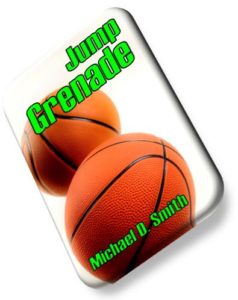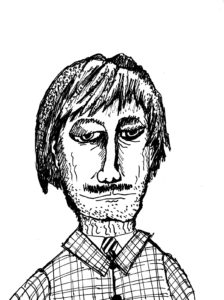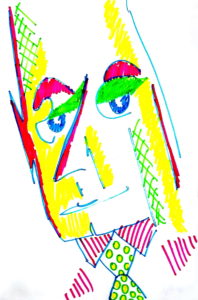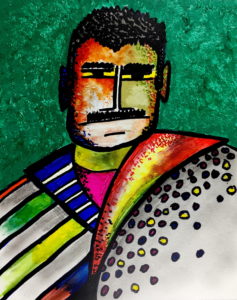Jump Grenade – The Author Interview
 Q: So what’s this crap you’ve got now? Jump Grenade? And don’t give me any of those typical BS marketing blurbs.
Q: So what’s this crap you’ve got now? Jump Grenade? And don’t give me any of those typical BS marketing blurbs.
MDS: All right, guy, let’s get into it. Basically the novel is about psychopathy, how much fun it is to win at any cost–and how surprised you are when you discover that the cost is karmic, stretching across thousands of lifetimes.
Q: Yeah, right. You’ve led everyone to believe it was about some kid basketball player.
MDS: Well, it certainly is. I had a lot of fun writing a sports story. I had to stretch a bit to do that. I wanted sports writing, visceral and sense-oriented. The casual insults and curses everyone hurls at each other evoke the mandatory ego-jockeying of the sport.
Q: Was the title intended to be stupid, or did it just come out that way?
MDS: The title is karmic. Billy has to meet a transformed version of his girlfriend at the end: a forceful and unknown Universe Ryder. Instead of a jump ball they contend with a jump grenade. His shamanic powers of winning and fame are finally throttled, but Uni’s powers of truth and responsibility are now growing.
The Draft One title was Ocean Singe Horror, the moniker Billy took right before he blew up the Baltimore arena. It’s an anagram of Orange Rhinoceros, and for more information, search for the term on my blog. I changed the title to Jump Grenade so we can figure out that the book is about basketball. Of course the cover should clue you in on that.
Q: Okay, the cover’s a decent image. You did the whole thing by yourself, didn’t you? Then again, maybe you should’ve hired a professional!
MDS: I was really leaning towards using camouflage spray paint on a basketball! Originally I thought using two basketballs would be too cute, evoking the relationship of Billy and Uni. But in experimentation, the two basketballs against the bright white background worked. It’s intensely three dimensional, with a lot of airy space, not the typical close-up of objects I’ve done for The Soul Institute, Akard Drearstone, or Sortmind. This does not look like my normal covers, which is also what I wanted.
Q: Yeah, but now I find that Jump Grenade’s based on another one of your old stories from childhood. C’mon, don’t you have anything new?
MDS: Jump Grenade is new consciousness. It has current energy that speaks to me, though it’s also connected with the past. Yeah, in 2008 I came across an old ninth grade story, “The Saga of Billy Bam, Basketball Star,” and it was so farcical that the idea of expanding it with modern themes instantly intrigued me. I didn’t care if it wound up as another story, a novella, or a full novel, I was just going to let it come out at its own rate even as I readied myself for other new writing.
After finishing the rough draft I let it sit while I worked on other novels. Then in 2014 I made an EPUB of the first draft so I could read it on my phone, and I found myself laughing out loud at it at D/FW Airport. I figured I owed it to the universe to get the novel in passable shape. The second and third drafts didn’t disappoint me; I still find myself laughing at my own novel. Maybe I shouldn’t, but the ludicrousness of this thing keeps hitting me.
I have a lot of old novels I’d never consider rewriting or publishing. They were just experiments. No energy resonates from those, and I seem to be done looking backwards to refurbish old works. The Core now understands there are no more old novels to fix up, that it’s time to embark on new paths. That isn’t balking me, although plot, characters, and structure for a completely new novel are still unknown.
Q: So here’s the standard stupidass question: where’d the idea for the stupidass book come from?
MDS: It goes back to Spring 1967. After a series of family moves to various towns on the east coast, I found myself in Wilmington, Delaware my ninth grade year. Since it was becoming too much trouble to make friends and lose them every eleven months, I stuck to myself that year, which I’ve always called my loner Lee Harvey Oswald year. After school I shot baskets by myself in the driveway, and there I made up most of the plot of the sardonic, blood-soaked “The Saga of Billy Bam, Basketball Star.”
Two inspirations were at work: at the time there were TV commercials about a loser kid basketball player named Billy Bam who’s transformed into a basketball hero after drinking grape juice. The second was that, in an effort to curb kids at my junior high from playing with pipe bombs, the school assembled the student body in the auditorium to hear a bomb expert. He got our attention by holding up ten fingers and telling us how unusual this was in the explosives business. He then detailed exactly what would happen if he lit a stick of dynamite next to his head, gruesomely describing his own decapitation, the deaths of everyone in the first few rows, and the shrapnel injuries and pierced eardrums in the following sections. Which is where I was sitting, eagerly absorbing all of this information for a story I didn’t know I was about to write.
As a kid writer in a dry period after abandoning Draft 1 of The Martian Marauders the previous year, I had a youngster’s easy preoccupation with literary catastrophe, stretching back to age seven’s The Gore Book. Ninth grade included the Apollo 1 fire, and my guilt at having written “The Flight of Gemini X-1” the day before, about a space mission catastrophe. The spring also offered an astonishingly transcendent endorphin high walk home from school, Civics class and its dreaded report on the Wilmington Water Department, science fiction from the local library, Egyptian history, the first hint of nearsightedness, pushups in the basement, our cat Ming’s slash across my lip which is still visible, Star Trek season 1, the ceramic yellow pyramid, Shakespeare, defensive ping-pong, and letters exchanged daily between me and my New Jersey friend Sabin that showcased new writing voices for both of us.
Q: Boring! And now you’re claiming there was some fancy new vision in 2008.
By 2008 I was anxiously wondering whether I still had novels in me. I’d finished Nonprofit Ladies in 2003 and started its rounds of query letters to publishers, but in 2006 I saw how terribly off it was, even vulgar and deluded. This sparkled a writing revolution. I revamped that book into the eventually published Nonprofit Chronowar, and set to examining other works that, even in final manuscript, badly needed revisions. I went into a revision mindset. No new works had come after 2003 except for “Perpetual Starlit Night,” and even that was cut down from failed novel notes. That the story itself was successful, and eventually published, didn’t assuage my worry about failing to come up with expansive new novels.
Still in backward-looking mode, I transcribed 1967’s “The Saga of Billy Bam, Basketball Star” just to have a digital copy of the handwritten manuscript. But a flood of current energy pounced. Ideas opened up about how I could expand the story into the novel Ocean Singe Horror. I added young dropout Guenevere Ryder and delved into her father Dan’s life-extinguishing fears of aging, failure, and loss, anxieties that finally meet a modern set of answers. Though still linked to 1967 moods, the novel now described the concerns of a current era.
I let the book sit for six years. Then came the 2014 perspective on it and the slow realization that the story is not only hilarious but important. I changed the title to Jump Grenade and vowed to publish it, Akard Drearstone, and Sortmind. Revising all three has had major life-force impact.
I decided to accept the plot as it essentially was, feeling the 33,000-word novel couldn’t really be padded–though I did cut it to 32,500. Then came the magnificent cover, and I could see the final, published product coming together. There is also a sense of closure in realizing that Jump Grenade really does represent my last backward-looking novel.
Q: So what about this idiotic concept of a Junior Dropout Basketball League?
MDS: Madeline and Hiram Bolamme are wealthy do-gooders who started Junior Dropout Basketball in Billy, North Carolina. Hiram had always longed to coach youth sports in addition to his calling as an art gallery owner. Madeline is the director of The Bolamme Center for Hurt Feelings, with skills in both profit and nonprofit management. The two thought a special basketball league could help aimless kids dropping out of school.
The JDBL concept caught on. Soon high school players, required to be dropouts and stripped of any association with their schools, were playing in major arenas. Hiram and Madeline got four teams together the first year, then other cities and towns got wind of the idea, and now in their third season they have a twelve-team league, in towns as far away as Plattville, Maine.
Q: God, this whole book is nonsense. I can’t believe how much farce you packed into such a short book.
MDS: That was definitely my intention. There’s a mix of the real and the fantastic in the book. Part of its absurdity is the off-balance real versus fictional locales. A real Baltimore and an unreal Billy, North Carolina. Explosives hidden in basketballs capable of destroying major civic centers. A kid who can shoot 999 points without a miss as long as he stays transcendentally lubricated on LSD.
I have a fictional publication, The Billy Courier-Gazette, but mention real magazines like Maxim, Hustler, Sports Illustrated, and Seventeen. I used Baltimore because of its association with attending games there as a child, whereas the other basketball towns are made up, like Pilsdale, Virginia and Plattville, Maine.
Q: So what’s your basketball knowledge? Of course we demand that the author of this book be a total expert on all aspects of the game.
MDS: I loved the game as a kid and my father took me to several Baltimore Bullets games in Baltimore. That was even before three-pointers existed. And I attended lots of high school and college games later. Recently I brushed up with several books on basketball, and double-checked facts on reputable web sites. But I finally realized I didn’t have to gain rigorous inside basketball knowledge to finish this book. Cramming for the test is not my novelistic way. For instance, the point guard is supposed to be the leader of the team on the court, but Billy is going to dominate the team no matter what position he plays. He likes to be the center because that sounds so central and important. Also, the high school dropouts, like Frank Chester, don’t care about following prescribed basketball conventions. All in all, the book feels right with its current level of basketball and sports jargon. I think the background is enough for the average reader. The announcer play-by-play commentary sounds real to me.
Of course the explosives stuff is pretty outlandish. American Ego Basketball Manufacturers of Grayton, Arkansas has a lot to answer for.
Q: Okay, why are there four referees in the first game? The standard is two or three.
MDS: So you counted them, huh? From my research I see there are usually one lead referee and one or two “umpires.” I call them all refs, as most spectators would. In the Junior Dropout Basketball League the refs are employed by the JDBL, and there are four assigned to each game: the standard three, and one backup, the implication being that Billy will render at least one of the four senseless. In the first game described in the book, the fourth ref mentioned is a backup for one of the ones Billy punched out. I just didn’t want to overburden the reader with detail about such a minor situation.
Q: What about the use of all caps in the P.A. announcements? Doesn’t this violate every literary rule about using all caps? Isn’t it a totally unethical stain on the very fabric of the book publishing industry?
MDS. Yeah, but so what? I went back and forth on that one, and tried the radio booth dialog both with all caps and without. I went with the all caps. The unendurable echoing of the P.A. system is another dose of absurdity in the book. The arenas vibrate with sportscaster blather and people’s ears literally hurt from it. Billy gets only partial information from the cacophonous P.A. system about what his father Hiram might be doing to Uni.
I also had an interesting observation during the publishing process. Since it’s a short book, I figured I could go with Times New Roman 13 or 14 and let the page count expand as it would. However, I noticed that the all caps in TNR 13 and TNR 14 made for extremely stretched out spacing in full justification, like four small words taking up an entire line because the fifth word is a bit long and is sent it to the next line. So I decided to keep it at TNR 12, and the all caps looks good that way.
Q: God, how incredibly fascinating. And as far as your wimpy back and forth wavering goes, I heard you had a hard time making up your mind to actually publish this thing. Does that mean you’re a coward? Are you just faking it? Do you really have any concept at all of what you’re doing?
MDS: I did wonder about whether to release this novel into the world. The final decision was based on: 1) continually finding myself laughing out loud at the book, even during the endless final read-throughs, and 2) the themes of karmic redemption that start thwarting all Billy’s ego-driven schemes. Cheating to win at basketball is a metaphor for any human’s soul education. Dan Ryder’s thralldom, along with his daughter Uni’s–in fact everyone’s–is our initial reaction to confronting inexplicable evil.
Jump Grenade is one of those almost effortless novels I sometimes get, like The First Twenty Steps or CommWealth, something that quickly bursts out and doesn’t need agonizing revision. Every once in a while you get a novel that comes that easily. You need to be able to accept the gift gracefully, knowing your next novel is probably going to be a major hassle.
At this point I can’t really see what needs to be improved, added, or strengthened in Jump Grenade. It’s a short book with its own magic. I’ve wanted to do the best I can with it. The bottom-line question is always: does this book have anything to say? I believe it does. Even with the various doubts I’ve expressed along the way, it feels appropriate to finish this project and put it out there. Jump Grenade is a publishable novel.
Q: Yeah, but it’s a pansy book at 32,500 words. C’mon, is this a real novel?
MDS: 32,500 does mean that it’s very short, and it could be construed as a novella. I don’t really care. This feels like “short novel” to me. As I’ve said before, there is absolutely no reason to try to pad this thing to 50,000 words. It’s like trying to pad a poem.
Q: Oh great, so you’re a poet now! Look, I got a bootleg copy of the first draft. It was filled with the worst four-letter words. Why’d you cut it back, Mr. Poet? Isn’t Billy supposed to be foul-mouthed? Are you really too insecure to sling out the dazzling four-letter haikus with the best of them?
MDS: Notwithstanding my puzzlement that you were somehow able to hack into the first draft of Ocean Singe Horror, I will just say that this is yet another issue I went back and forth on. The first two drafts had anything goes as far as obscenity, but the filthy language was one of my points of reluctance to show it to the world. In any case it was actually fun to downgrade the book’s obscenities. Billy still comes off as extremely potty-mouthed and disrespectful.
I de-obscenified Jump Grenade according to my Jack Commer series standards: never employing the usual four-letter expletives, but allowing words like damn, crap, and ass. Billy seems to revel in gluing these milder words into worse-sounding strings.
While I agree that certain novels need to retain a level of obscenity natural to their characters, I also know some people are offended by these obscenities, and that does reduce your audience. Also, many authors just can’t keep their personal issues, their anger and their libido, from polluting their novels. They just hang out all their rage and lust as they write, and can’t see around their own corners to understand what’s really needed in their novel. Keep in mind that The Brothers Karamazov explores the worst depravity in human nature through its 900-some pages, and there is no obscenity in the book.
Q: Back to this insipid laughing at your own work you keep mentioning. Do you really think that’s any sign of quality writing?
MDS: Of course I can’t say. But it seems to me that the funny passages have special energy and absurdity to them. For some reason I haven’t grown bored with those parts. One thing I’ve noticed with people reading my other works is that they will also mention laughing at certain parts, and when I ask them where that happened in the book, it’s usually the same place I was laughing at.
I’m still amused at the picture, as reported by his contemporaries, of Franz Kafka reading portions of The Trial at literary gatherings and laughing at his own absurdities.
Q: Oh great, now you’re going to compare yourself to–
MDS: Oh, shut up!
Q: Okay, mister great and touchy author, are you a psychopath yourself, to kill off thirty thousand people during the course of this book?
MDS: Is there something wrong with me that I blithely dispense with thirty thousand innocent basketball fans? Okay, friend, this is a novel. I wasted something like six billion in The Martian Marauders. Jack Commer personally offed two billion when he dropped the Xon bomb on the Central Asian Powers. I’m exploring a psychopath’s personality in Jump Grenade. What can I say? The shoot needed a lot of extras.
Q: We heard you kept a sensitive little diary for writing Jump Grenade.
MDS: Not from the beginning. I decided to make a Jump Grenade Diary a few months ago by copying in every relevant mention I could find in 2008-present journals. So it was archival at first but since then I’ve been adding to it every few days. It’s now up to 14,500 words. It showcases the book’s development, muses on characters and themes, and experiments with marketing concepts.
Q: Genre? Gotta have one, you know, or every word you wrote is goddamn meaningless.
MDS: I do need to figure out what genre this short novel belongs to, though I’m never satisfied with fitting any of my books into a genre. I made two up: Absurdist, and Theater of the Absurd. Then I saw Literary Fantasy, but I don’t think that means “fantastical,” just sort of high-brow Tolkien stuff. Then there’s the old standby, Literary Fiction–
Q: Sheesh! Are you kidding me?
MDS: Yeah, probably. Then we have Psychological Novel, Sports Fiction, Young Adult Fiction. Nothing really seems to work.
Q: No wonder, dude. Ah, the hell with it! You keep mentioning all this karma BS. What’s up with that anyway?
MDS: In the final drafts I was forcefully struck by Dan Ryder’s despairing, hallucinogenic travels to the Other World as his wife Emala calmly sets about rescuing him from dream planet Lamura. Uni’s psychic powers manifest at the end along with her heartfelt solution to mass murder, and Billy at least partially comes to his senses. Uni feels that living in a Tibetan monastery in the clouds, atoning for thirty thousand murders through thirty thousand lifetimes, will solve it all. I can’t help but feel that this is exactly what a naïve teenager would say. On the other hand … it seems to me Uni has to be right. The book points to the Other World. Human beings will do anything to reinforce their ego. Psychopathy is just talking that to the logical extreme. But then karma eventually kicks in, and you have to pay for the hurt you caused to other people.
 Q: Heavy. Rumor has it that you’ve had some even heavier insights after you inflicted this thing on the world. Fork ’em over and maybe we can be done with this idiot interview.
Q: Heavy. Rumor has it that you’ve had some even heavier insights after you inflicted this thing on the world. Fork ’em over and maybe we can be done with this idiot interview.
MDS: Just that I’ve needed to put this book out there. Jump Grenade does close out the long slog from November 2006 on of looking at what energy needs to be explored in older writings. I won’t absolutely rule out someday looking at older stuff, but for now the need to do so is gone. After going back and forth for so long about whether to publish this novel, sometimes seeing it as silly and too easy, other times seeing it as valuable psychology and laughter, and after the past few weeks of endless rereadings and edits, and the semi-stressful publishing, I suddenly do feel the era of looking backward is truly completed. Over the past couple days it’s really hit me. It’s quite an unexpected feeling. I see now I have to accept Jump Grenade for whatever it is, do the marketing stuff, sure, but know that I’m done with it. It seems that I’ve created some open space for new art. I feel fresh energies, and I’m already asking the universe/my channel for new dreams and some What If ideas. I’m eager to get to the third draft of Balloon Ship Armageddon, Jack Commer Book Seven, but something new can even start alongside that.
copyright 2019 by Michael D. Smith





Comments
Jump Grenade – The Author Interview — No Comments
HTML tags allowed in your comment: <a href="" title=""> <abbr title=""> <acronym title=""> <b> <blockquote cite=""> <cite> <code> <del datetime=""> <em> <i> <q cite=""> <s> <strike> <strong>